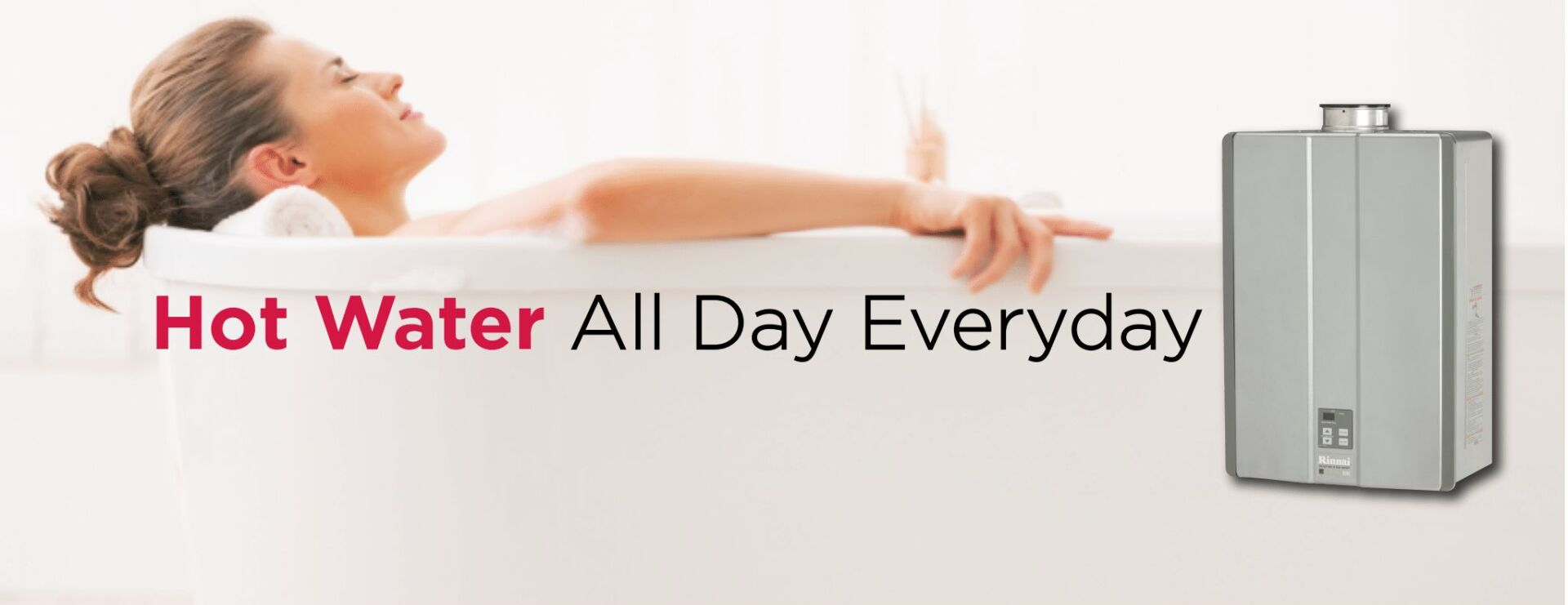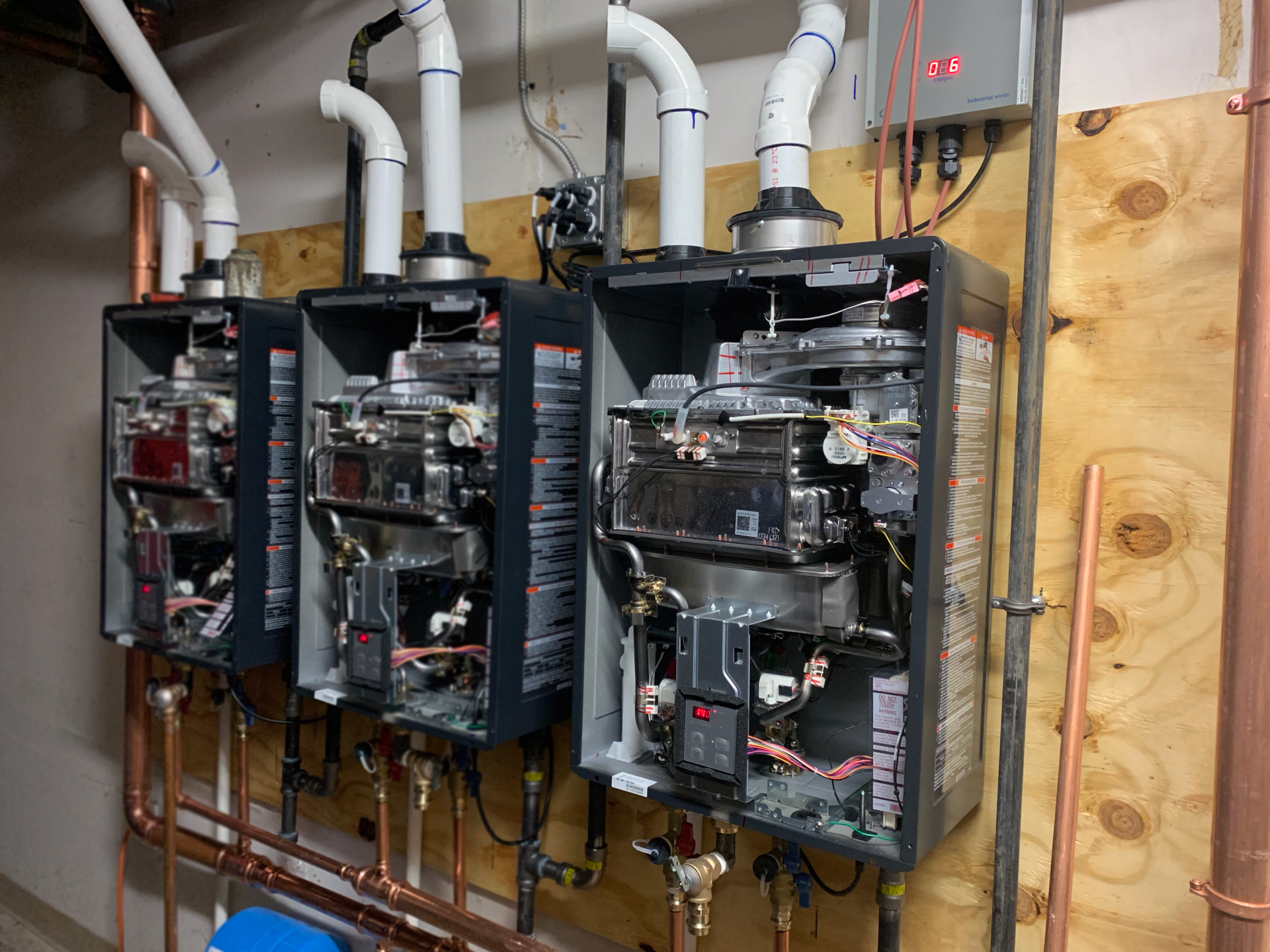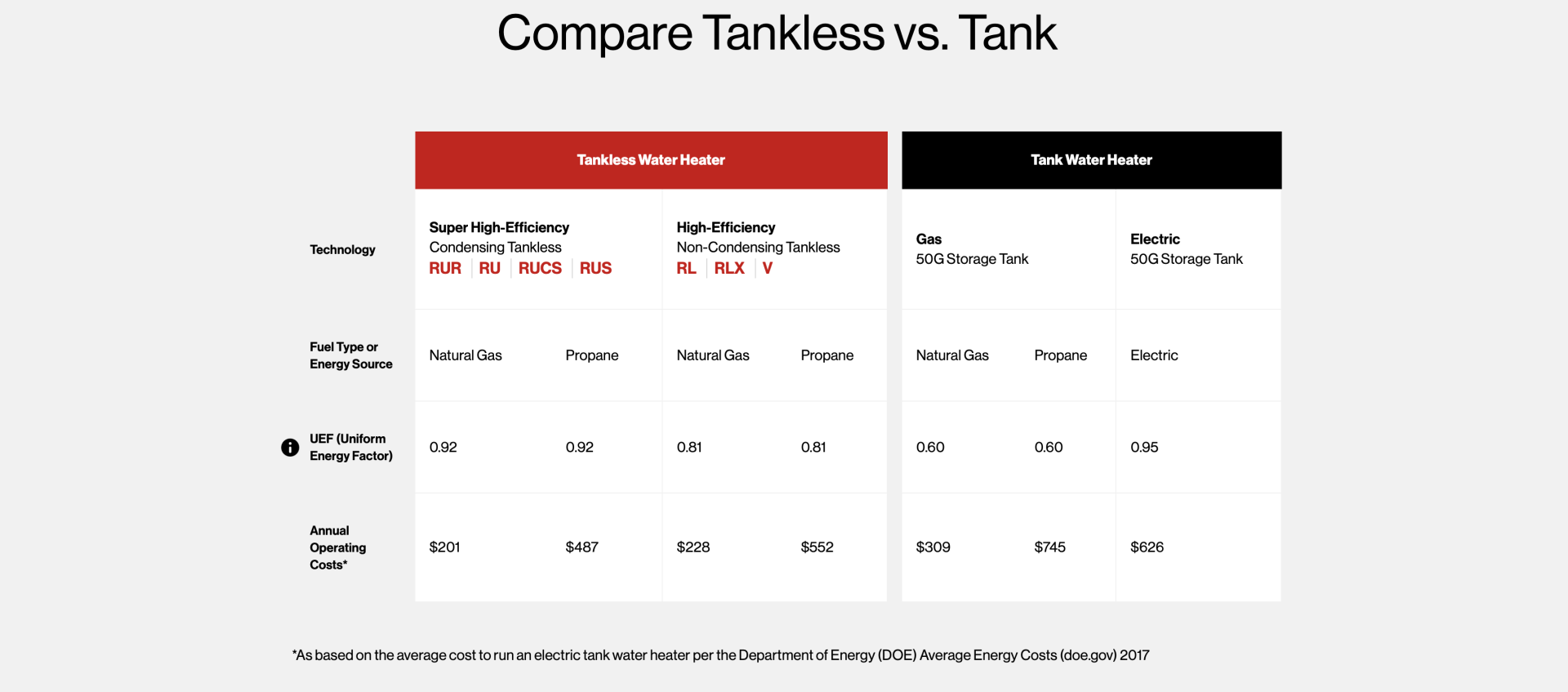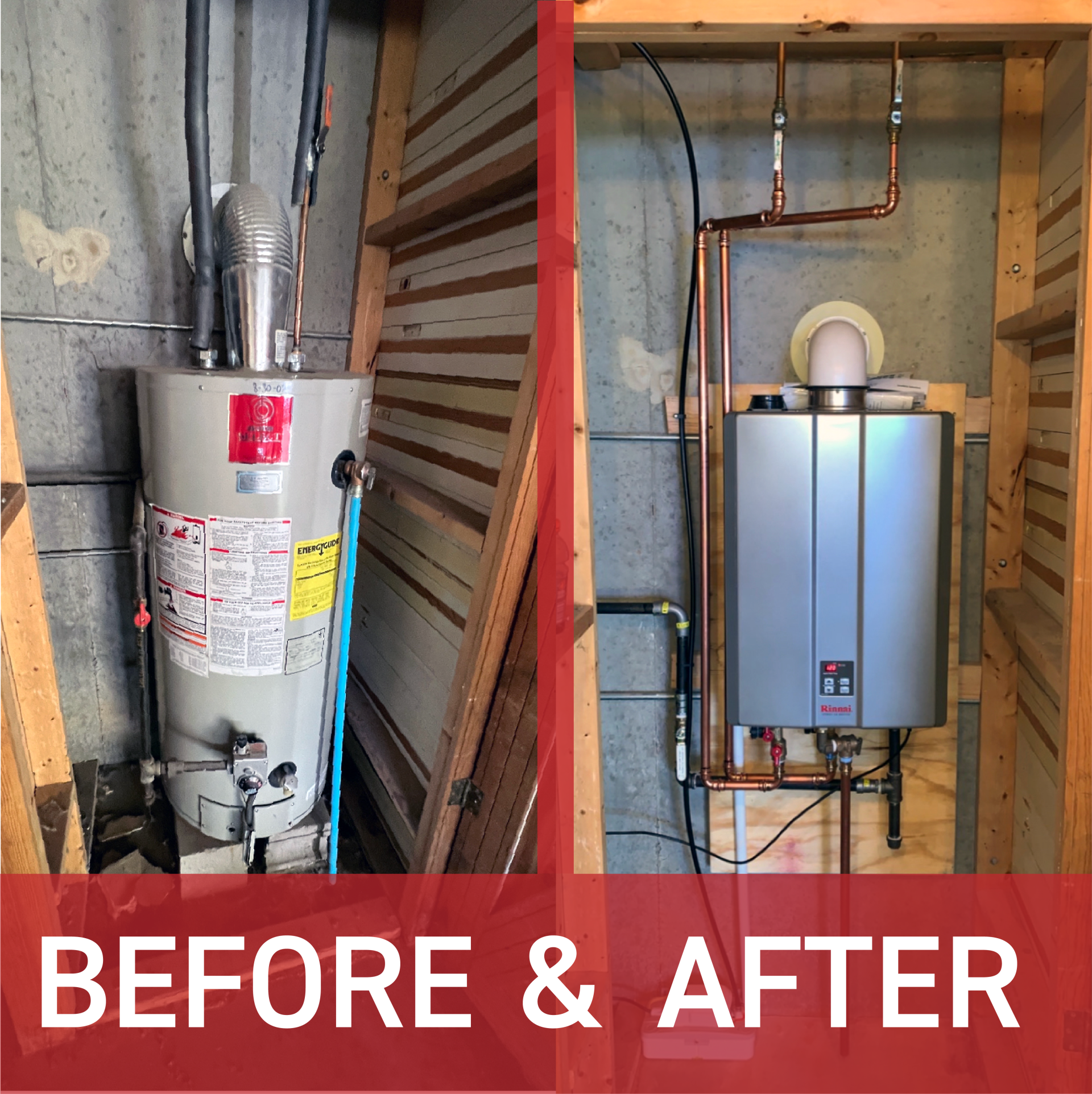Pros and Cons of Tankless Water Heaters
Pros and cons of tankless water heaters: Should you buy one for your home?

What is a tankless water heater?
A tankless water heater will heat the water on demand as it is needed rather than heating up all of the water the way that a traditional water heater does. Rather than having a large, bulky tank filled with water at all times, a tankless heater ensure that you will never run out of hot water and be left having to take a cold shower ever again. You can rest easy knowing that cold water is a thing of the past with an endless supply of hot water!
There are different types ways that could be used to power tankless water heaters: gas water heaters, propane water heaters or electric tankless water heaters. JF Denney offers Rinnai units which are gas tankless systems. According to JF Denney, a gas tankless hot water heaters work by heating water as it passes through a series of coils. The coils are heated by a gas burner, which ignites when the water flow is turned on. The hot water is then sent to your home’s plumbing fixtures, providing a hot water supply throughout the whole house while keeping energy costs down and savings high.


As water heaters are one of the largest energy-using appliances in the home, their efficiency is important to consider when it comes time for a replacement. JF Denney offers both traditional tank heaters and tankless (or on-demand) water heaters, so customers can choose the option that best suits their needs. In this article, we'll compare tank and tankless heaters in terms of their energy efficiency, initial cost, and maintenance costs.
Tankless heaters are more energy-efficient than traditional tank heaters because they only heat water when it's needed. Traditional tank heaters constantly use energy to keep a reserve of hot water on hand, even when it's not needed. A tankless water heater can provide immediate hot water on demand without having to heat and reheat a reserve of water. This makes them more efficient in terms of energy use and can lead to lower energy bills.
Tankless water heaters also have a higher initial cost than traditional tank heaters. This is because tankless are more complex and require more installation work. However, tankless water heaters often last longer than traditional tank water heaters, so they may end up being more cost-effective in the long run.
Tankless also requires less maintenance than traditional water heaters. This is because there are no tanks and no water to be stored in them, so there is no chance of leaks or other problems associated with conventional water heaters.
When it comes to choosing between a tank and a tankless water heater, JF Denney customers should consider their needs and budget to decide which option is best for them. Tankless water heaters are more energy-efficient and have a lower long-term cost, but they require a higher initial investment. Conventional water heaters are less expensive upfront but may be less efficient and require more maintenance over time.
Pros of tankless water heaters
- Their compact size means they need less space.
- You will have unlimited hot water on demand - say goodbye to inconvenient cold water!
- Tankless water heaters are more efficient than storage tank water heaters, which means more money saved in the long-term.
- When compared to conventional water heaters, tankless water heaters tend to work longer. Tankless water heaters have an average lifespan of 20 years whereas storage tank water heaters last an average of 10-15 years.
- Many tankless water heaters provide a long-term warranty, giving you more peace of mind.
- Tankless systems are Energy Star Certified units.
- A tankless water heater is easier to maintain than conventional water heaters.
- Tankless water heaters are about 24%-34% more energy-efficient than storage tank water heaters.
Cons of tankless water heaters
- One of the biggest cons of tankless water heaters are the initial costs required upfront. While lower energy costs will lead to you being able to save money, the system does require expert installation. However, there are many financing options available to help.

What should I consider when getting a tankless water heater?
- Home size.
- Family size.
- How much water usage you have.
- Where you live, in terms of the climate.
Is a tankless water heater worth it?
- Tankless water heaters are a long term investment.
- Tankless water heaters have a more expensive upfront cost than traditional water heaters do, however they will end up saving you money in the long run.
- If you are interested in a tankless water heater, do your research.
- When choosing a water heater, there are a few things you need to keep in mind. First, you need to decide what fuel type you want to use. A tankless water heater can be powered by electricity, natural gas, or propane. Each fuel type has its own set of pros and cons, so make sure to do your research before making a decision. JF Denney can help by connecting you with a tankless water heater expert to go over installation costs and any questions you may have about the system.
How do gas tankless water heaters work?
JF Denney says that gas tankless hot water heaters work by heating the supply of hot water as it passes through a series of coils. The coils are heated by a gas burner, which ignites when the water flow is turned on. The hot water is then sent to your home’s plumbing fixtures, eliminating cold water when it isn't needed.
How do electric tankless water heaters work?
An electric tankless water heater, also called a “demand-type” or “instantaneous” water heater, provide hot water on demand. They don’t work like typical storage water heaters. Storage water heaters have a tank where water is continually heated and stored until the water needed.
An electric tankless water heater is a type of water heating system that heats water on demand. It does not have a storage tank like typical water heaters. Instead, it uses a heating element to heat water as it passes through the unit.
What are the benefits of going with Rinnai tankless water heaters over other brands?

New While there are many different brands of tankless heaters, the one that JF Denney works with is Rinnai.
- Offers and rebates (tax credits)
- Due to the energy efficiency that is provided by the tankless water heater, you may find that rebates or tax credits could be offered. These tax credits will vary depending on the state that you reside in. Federal tax credits may also be available.
- Certified pro installation techs
- Warranty
- Most tankless water heaters come with a five-year warranty, but Rinnai comes with a longer warranty. JF Denney also offers a variety of different water heaters with different warranty options, so you can find the one that best meets your needs. Multiple financing options for the initial installation costs are offered both through Rinnai and through JF Denney ourselves.
- Many versions of tankless water heater systems are offered.
- Condensing Water Heater Units and non-condensing water heater Units.
- Condensing Water Heaters
- Condensing water heaters have a second heat exchanger and the exhaust is looped back into the system to heat the water more efficiently. These condensing water heaters have a higher degree of energy efficiency and are a good choice for areas where the climate is colder. These systems do have a higher cost, however the materials used are more flexible. Condensing water heaters must have the condensation at the bottom of the heater drained.
- Non-Condensing Water Heaters
- Non-Condensing water heaters have only one heat exchange compared to the two that condensing units provide. The exhaust gas on the non-condensing units are ventilated out of the top of the heater. If you live in an area where the climate is warmer, a non-condensing heater would be the right choice for you. These systems are easier to provide maintenance to and they do not require the condensation to be drain, so long as the unit is vented horizontally rather than diagonally.
- Hybrid tank and tankless water heaters.
- Hybrid Tanks
- Tankless Water Heaters
When considering a tankless water heater, why should you consider using JF Denney?

JF Denney has been in the business for over 60 years and is a trusted name in the industry. JF Denney offers a wide range of services, including tankless water heater installation, repair, and maintenance. JF Denney also offers a variety of financing options to make your purchase more affordable. JF Denney offers free quotes and can provide expert installation technicians while helping you chose the model that is right for your home.
Contact JF Denney for a free consultation on installing a tankless water heater in your home today!

